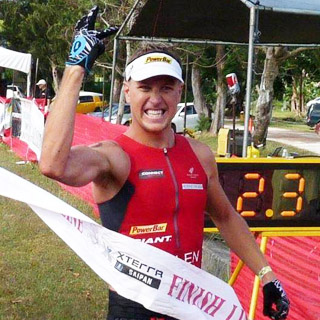Jacqui Slack’s XTERRA fire
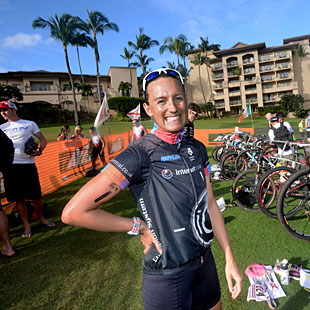
Jacqui Slack is cool under pressure and proved it in her career with the Fire Service in the United Kingdom where she occasionally put on an oxygen mask and helped lead fire victims out of burning buildings. Slack also learned how to control her nerves directing Jaws of Life operations to pull injured accident victims out of smashed up cars.
So when this slender 29-year-old Brit was taking on her very first XTERRA World Championship in Maui this October against the likes of Olympian Barbara Riveros Diaz, 4-time XTERRA World Champ Melanie McQuaid, defending champion Lesley Paterson, 70.3 star heather Jackson, Swiss star Renata Bucher and Olympian Mari Rabie, you didn’t expect her to fold, did you?
Slack, in just her third year as a pro and sixth year as a triathlete, had some success at big UK pavement triathlons including this year’s Windsor Triathlon. But she seems to have found a niche in XTERRA despite playing catch up with her work-in-progress mountain biking skills. She took 5th place at Maui, ahead of many champions but looking at her mistakes and eyes firmly focused on the next year’s podium. This year, she established herself firmly among the XTERRA challengers with wins at New Zealand and Italy, 2nds at XTERRAs Philippines and Saipan, 3rds at XTERRAs Guam, France and Switzerland, and 4th at Czechoslovakia.
The past two years, Slack and boyfriend Ben Allen have teamed up to become the most successful couple on the elite worldwide XTERRA circuit. Allen swept the early season Asian races and took 2nd at the XTERRA USA National Championship while Slack was a consistent podium bet all year. They insist that their mutually supportive and understanding relationship is a key factor in their success in races and in life.
The interview was conducted before the race at Duke’s Beach House Restaurant in Lahaina, Maui.
Slowtwitch: Where did you grow up and what was your first sport?
Jacqui Slack: I grew up in Stowe, Buckinghampshire in Great Britain. I swam from the age of 8 until about 15. My mum took me swimming until I got out of it due to a back injury I got from doing weights at an early age. I slipped a couple of discs in my back which trapped a nerve and gave me sciatica. I tried a lot of things to fix it but in the end acupuncture did the trick.
ST: What was your best time at any distance and stroke?
Jacqui: I did my fastest time in the 400 free when I was about 13 or 14. I think I did about 4:49 to get to the nationals. Unfortunately I got the back injury.
ST: How did you recover?
Jacqui: I took a couple of years off and I started running in the gym a little and swimming a bit to keep fit. When I was 21, a friend from work got me to buy a road bike which as it turns out helped prepare me for my discovery of triathlon.
ST: Tell us about your studies and work?
Jacqui: I left college early and started a vocational qualification course in management. I got various jobs working in the City Council as a leisure manager at a sports center. I did that for a few years and I really, really enjoyed that style of work. I was definitely a people person and I was good at managing the staff and training sessions. I got to know about triathlon because of the type of people I worked with and through members coming into the gym.
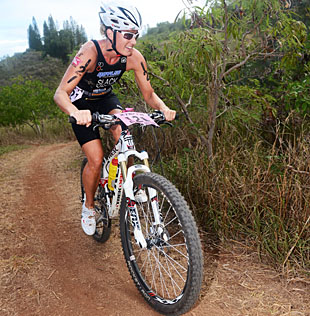
ST: You changed jobs just as you started triathlon?
Jacqui: In 2006 I applied for the Fire Service and straightaway got through the interview process. I passed all the fitness tests and started working in the fire service that same year I went to my first age group world championships in Lausanne.
ST: What was Lausanne like for you?
Jacqui: That was an amazing experience. I thought I’d made it then – to represent Great Britain at the age group world championships! That was the same one when Chrissie Wellington smashed the field to win the women’s overall age group title. Tim Don won the world champs there and I saw a few real role models and I knew I wanted to pursue triathlon.
ST: Thus inspired, what was your first step in raising your game?
Jacqui: I got a coach and he saw a lot of potential in me. He encouraged me to start racing the elite level and said I’d be good enough. Without him I’d never thought I’d could reach that level.
ST: At that time you began to fight fires?
Jacqui: Yes. It was pretty cool. That is the best part of the job.
ST: Like smashing through doors with your axe? Putting on the oxygen mask and carrying babies out of burning buildings?
Jacqui: I think the oxygen mask is my favorite thing. I didn’t smash down too many doors. But I was pretty good at putting on the breathing apparatus and going in and finding people to lead out of the fire.
ST: What was the toughest part of the job?
Jacqui: The messiest part of the job was going to car crashes. We dealt with a lot of traffic accidents and used the Jaws of Life to get severely injured people out of the smashed up vehicles. We cut a lot of people out of cars. It’s very emotional, very frightening where you see the fear in someone’s eyes. That was the hardest part of the job. But the best part of the job is working in a team.
ST: In the USA, the fire departments often requires women to carry heavy equipment up ladders. In the UK they don’t demand a weight lifter?
Jacqui: Not at all. In the UK they want more females into the fire service. I’d say 90 percent of the job in the UK fire services is prevention. We went to local communities and did home fire risk checks, installed smoke alarms and talked to school kids. So really only 10 percent of the job now is responding to incidents. Due to better fire safety regulations, there are fewer incidents and most are not as serious.
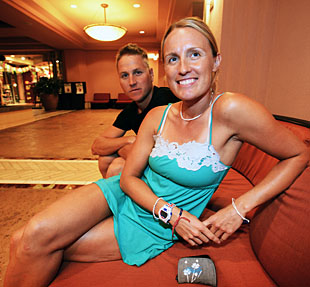
ST: When did you start to believe you belonged at the elite level in triathlon?
Jacqui: In 2009 I had some good results in domestic races in the UK. I think I finished 6th at the Windsor Triathlon elite race. At that point, I started to look into the European Cup races. I could see some of the other girls I had beaten in the past and I thought I’d be able to do that.
ST: What were your race splits in that period?
Jacqui: In my first standard Olympic distance I think I went a 2:20, which was a really good time. Soon I was swimming around 20 minutes, biking about 1:10 for the 40 kilometers and I ran the 10k in about 40 minutes. That was a good start as I wasn’t training much in the bike and the run.
ST: When did you start to improve?
Jacqui: In 2010, I asked the Fire Service to approve a sabbatical. To make ends meet, I had some sponsorship from Internet Central, a local company that supported me for the age group world championships. They have continued to financially support me to this day and have been a critical help to my success.
ST: When you took your sabbatical, what did you do with your freedom to train?
Jacqui: In 2010 I had the opportunity to travel a little bit and I went to Australia with my boyfriend at the time. I trained really well and gained everything I could and I came back to England and raced the European Cup in Strathclyde Park and won that race. I was pretty amazed by my performance and I made quite a bit of money. Most important, I won an ITU European Cup, which I never thought I could do.
ST: With full time training, how much did your performance improve?
Jacqui: My times were getting faster. I was probably running about a 37 minute flat 10k by then. My swimming was consistent and getting stronger — around 19 minutes for the 1500 meters. I was also biking a lot stronger. Although I didn't make the breakaways, I could ride comfortably in the main group and sit in.
ST: When did you start to catch XTERRA fever?
Jacqui: In 2010, I raced in Sardinia and got a little bit of money. It’s a beautiful place. I’d done a bit of mountain biking previously just with friends from the Fire Service. But this was my first XTERRA and it was the European Champs. That year. Melanie McQuaid won, Renata [Bucher] was there and I finished 6th. Not shabby, but I expected to do a lot better because my form was quite good. I was thinking ‘Aw this XTERRA is OK. I’m sure I’ll be fine.’ I enjoyed it but I found it a lot harder than I expected.
ST: So what did you do about that XTERRA wakeup call?
Jacqui: I realized if I wanted to do XTERRA I’d have to train more off road and longer distances. So, I carried on doing some more British pavement races. I think I got a 4th at Blenheim and a 3rd at Windsor, which was a breakthrough and I was making a bit of money along the way. I think I finished 2nd in the British Elite Series that year. Jodie Stimpson won, I was 2nd and Helen Jenkins was actually 3rd. But that was based on her missing a race. But yeah, I was in good company and I had a really successful year.
ST: Were you taking on some more international races?
That particular year I won a qualifier to the XTERRA World Championship on Maui and I also raced the ITU World Sprint championship in Lausanne. To prepare I did a training camp in the mountains in Morzine, France with some friends from the UK. Steve Lindley, who works with the Birmingham University team, was our coach. We did a few races while we were out there and the main goal was Lausanne. I went there feeling really good and my mum Janet came over to watch – she has watched quite a lot of my races.
ST: How did you do?
Jacqui: I made the front group on the swim, I went good on the bike and the run and I was really happy finishing 17th out of 55. I felt that that was an amazing result for me. I was the 2nd British athlete and I beat a girl I never thought I could beat in the ITU racing. The week after that I went to the last French Grand Prix race in Tours and raced with my team. I fell over in transition and fractured my toe, which meant I couldn’t go to XTERRA World Champs – so my season was over.
ST: You must have been optimistic about 2011?
Jacqui: After 2010, I went back and asked for another year off with the intention of trying for the British Olympic team.
ST: You picked the wrong country – going up against Helen Jenkins, Jodie Stimpson and a designated domestique.
Jacqui: I thought well I’ve got the time off. Why not go for it? You only get one chance. So I went off to South Africa that year to do some training. There was a coach there who’d helped me a lot with my swimming in the UK – a lady called Emma Swanwick. In 2010 she was a man called Kim Swanwick, then had a sex change operation. In 2011 she’d gone to South Africa to coach their elite swimmers and had a South African squad. When she asked me to come over and train with the squad, I felt that would be a great opportunity. But that didn’t really work out so well. We trained at altitude in Victoria, which wasn’t so high, only 1500 meters. But I worked quite hard and I overtrained a bit and got sick. I picked up a form of hepatitis through an infection. I left there quite disheartened and wondered should I go back to work or not?
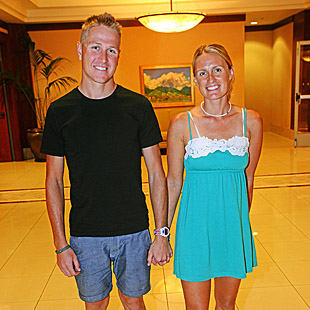
ST: So when did you recover?
Jacqui: I was well enough to do XTERRA Italy in Sardinia again in spring . Guess what happened there? That’s where I met Ben.
ST: Where did you meet?
Jacqui: It was the after party. There was a group of British athletes and we spoke English so this Aussie gentleman joined our group. He’d finished 3rd, a great result. When you get a good result everyone says ‘Ah, who is this?’ and the British triathletes started talking to him. So we got talking and I found he raced with a team in the French Grand Prix league. Which was what I was doing. We chatted and talked about meeting up at XTERRA France. Which we did. I wasn't well then and I was not training well at all really. So I went to those races because the trip was booked and I had nothing else to do. After that, Ben and I stayed together in Germany and I think then we started to have feelings.
ST: Many elite triathletes end up with fellow pros.
Ben Allen: I think the times and the situations that we’ve been through together have brought us closer. Traveling and racing together, we can both understand when we are tired or upset or angry and give each other the support and the space we both require.
ST: It doesn’t hurt that he is a handsome devil?
Jacqui: Nooo. That is positive. So we got together in September’s time, just after XTERRA Switzerland, which I didn’t race. After that, Ben came over and spent some time with me in England. We had about five days together and we actually started to call ourselves boyfriend and girlfriend. Then Ben headed off to Utah [to the XTERRA USA National Championship] and I stayed in England.
ST: Which gave you time to think about your future?
Jacqui: It was coming to the time where I had to make the decision to go back to work or request to take another six months sabbatical — if possible.
ST: Ben wasn't there to consult?
Jacqui: We spoke a lot on Skype. Anyway I spoke to a few people, asking for advice. A lot of people said ‘Go off and follow your dream!’ Obviously Ben made it a lot easier because he was doing it already. He was really positive and said we could perhaps do this together.
ST: Any doubts?
Jacqui: Still, we hadn’t really known each other for that long. So we threw ourselves in the deep end, so to say. I went over to Australia with Ben for a month to see if it would work and was something I wanted to do. And it worked really well. After the XTERRA World Champs, he had a bit of a break from training and I was building back up to doing some proper training again.
ST: Ben hadn’t had the greatest race at Maui in 2011. But he was about to have a great stretch to begin 2012. And you were building up too?
Jacqui: I was building back up from being sick for most of 2011.
Ben: Both of us hit rock bottom. This gave us opportunity to go deep inside ourselves to find our desire and passion and to rekindle the fire in our bellies – and get back into some hard training. Jacqui and I had a new outlook on life and we were really focused and determined. We felt if we could put in the hard work, we could achieve some good results.
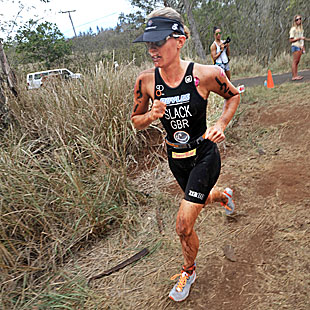
ST: Ben started off like a house afire. How did your year start?
Jacqui: My start to 2012 was a little bit slower than Ben’s. I’d only done two XTERRA races. So I was using the Asian races [Guam, Saipan and The Philippines] to explore XTERRA and find out where I was at with the mountain biking skills. I was really happy with how my races went. I made some money and I got some podiums. I finished 3rd at Guam and 2nd at the Philippines and Saipan.
ST: That put you in solid XTERRA pro territory. You must have gained confidence?
Jacqui: The Philippines was a good race for me because I’d been racing against Renata [Bucher] who’d won all of the Asian races. I think I was only 3 minutes behind her there and I was really pleased. The other races I’d been further behind, maybe 7 minutes. So I was getting closer and feeling more confident on the mountain bike. Obviously the experience in those races was just awesome. Ben and I felt the people we met were great and the experience I gained racing on those courses in those conditions were invaluable.
ST: You liked running down the jungle waterfall in Guam?
Jacqui: Oh yeah!
Ben: That was the highlight of the race. It was unreal.
ST: After that start, what next?
Jacqui: After that we headed back to Australia and then we did XTERRA New Zealand. That was an absolutely brilliant race for both of us. We both took 1st place. That was a massive breakthrough for me. That Ben and I both finished on top of the podium was a wonderful positive sign that it was the right idea that we got together.
ST: Next?
Jacqui: Then it was time to go back to Europe, back to where I live, back to see my family and start the European XTERRA season in Sardinia again. I had a really good race. I won and Ben got second.
ST: Ben had to fix you breakfast after that?
Jacqui: Luckily we were in a hotel.
ST: How did the rest of the season go?
Jacqui: Then we did the European XTERRA season. I finished 3rd behind Renata at XTERRA France . It was a true mountain biker’s course with a very long mountain bike leg. It’s a 4 hour race and we were on the mountain bike for almost three hours. The mountain bike is my weakness, so to finish 3rd and on the podium was really, really good. At Czech I had a few mechanical issues and lacked a bit of motivation but I still finished 4th. At Germany, I had problems with the course. I went the wrong way with another South African girl and a few age group athletes. We were disqualified in the end. It was a fair decision but it’s a shame really. The course was marked with arrows and the arrow at one corner was pointed left and the actual course was right. But ultimately it is the rider’s responsibility to know the course.
ST: Sounds like you were in the hunt for the European XTERRA series title?
Jacqui: Yes. There were five races this year and Switzerland was the last. In Switzerland we both got third and I finished second in the series in my first full year in XTERRA, I was pretty happy with that.
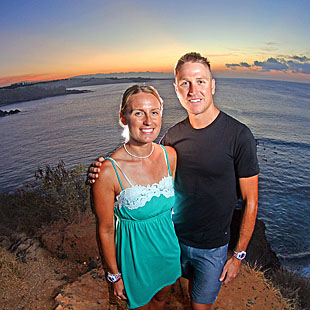
ST: With such a good season, where do you stand with sponsorship?
Jacqui: I've been quite lucky with a company called Internet Central which has sponsored me for the last six years financially. I wish there were more but there are not many sponsors out there like them. I am really lucky that the founder of Internet Central is to see a local girl do well.
ST: What do you do in return?
Jacqui: I try to give as much back as I can. I work with the local triathlon club and I attend training sessions when I am there and I answer questions and chat.
ST: What do you hope you might do at XTERRA Maui? It’s a formidable field.
Jacqui: This is my first time in Maui and I don’t want to come into the race thinking ‘Oh I’m going to be the best, I’m going to get on the podium my first time here.’ I've trained really hard the last four weeks and I’m fitter than I’ve been all year. If I have a good race like I did in Sardinia, there is no reason I can’t get on the podium. But it will be hard. It’s a mountain biker’s course and there are a lot of very good mountain bikers who have come from North America – Suzie Snyder and Danelle Kabush, Shonny [Vanlandingham] and Renata [Bucher] are all so strong. So I'm just going to go out there and give it everything I've got on the mountain bike, and look forward to the run. My run’s really good at the moment. I’m hoping if I can stay mentally strong, I can be in a good position.
ST: How well can Ben do here?
Jacqui: I've watched him train also for six weeks and I've never seen anyone as dedicated as he is and has put the effort and the work in as he has. I think if everything goes well — and it should because he has prepared well — he can be on top of the podium. [Allen was second to Javier Gomez until he suffered a broken chain at Mile 5 of the bike].
ST: How good of a team are you two?
Jacqui: We are a good team. We support each other heaps. And Ben is always giving me great advice. Before the races we warm up together and discuss what might happen and tactics. We keep each other calm. We keep each other sane.
ST: Do you think about Ben during the race?
Jacqui: During the race I am always thinking about Ben and how he’s going. I think sometimes I want him to do well more so than me purely because I have seen how hard he works and how much he wants it. It’s his dream. If I am not racing, I’d love to be there to give him some splits and to encourage him at the times he might need it. When the race is finished Ben is always coming back to see how I am going. I've gained places through Ben being there in the last couple of races. So we good for each other I reckon!


